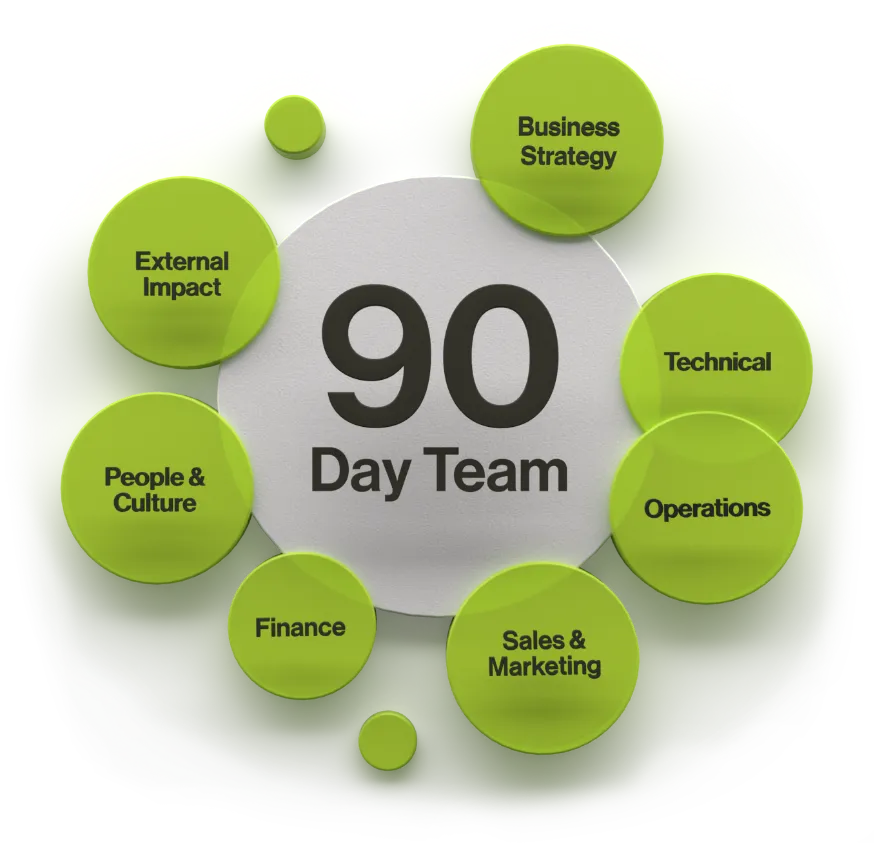
Our purpose:
To make a real and meaningful impact on the lives of our team, our clients and the community in which we live.
01
COVID-19 impact
In March 2020 the world was coming to terms with a new reality. Our commitment to the team’s health and wellbeing remained steadfast, and we were able to offer additional support during this difficult time - as well as after the lockdowns ended.
Voluntary furlough
Everyone’s home-life is different. With a forced lockdown, the difficulties of homeschooling, and a work-life balance to try and find, we wanted to ensure the team were able to put their wellbeing first. That’s why we offered voluntary furlough to the team and topped wages up to 100% for those who took the opportunity.
Work from home budget
Once the pandemic gripped the UK, we made the decision to become a remote first agency. This brought its own challenge to ensure our team had the ability to work from home comfortably and effectively. We launched a work from home budget – so anyone could buy what they needed to. There is no cap on spending, built around our value of ‘we start with trust’. The team can buy anything from desks and chairs, to cameras and wifi extenders.
Mental health support
The UK lockdowns presented a significant challenge for mental health, so we made it a mission to ensure support was there from the off. We encouraged regular catch-ups with our mental health first aider, extended mental health support to family members, and started working with mental health organisation, Sanctus.
Training budget
Similarly to the work from home budget, we introduced an ‘unlimited’ training budget in 2020, to encourage the team to focus on and be mindful of their development. People can spend what they need to, using the advice process within their team.
Financial support
Throughout the pandemic, people’s personal financial situations will have been very different. To support the team as much as possible during these times, Reddico offered:
Free mortgage advice
With access to a broker (especially if the team needed to take advantage of the mortgage holidays available).
Free financial education
Covering topics such as mortgages, pensions, investments, and money management.
Despite the pandemic, we were fortunate to be able to continue growing as well – adding seven people to the team over the last 12 months, as well as having numerous open positions too.
This is our first annual impact report and it brings together the difference we have been able to make over the last 12 months and what is on the horizon for 2021/22.
02
Team Impact
Our people and culture strategy is guided by our principle of making Reddico a great place to work.
We share the following statement in our initial onboarding with every new team member, and all of our decisions reflect this:
To build a people first company where people enjoy coming to work, feel good about themselves, feel valued, and where innovation flows.
2020 was a tough year for everyone – there’s no denying that. However, we made it a mission to continue our people first approach, live and be inspired by our values, and build a company we can be proud of.
This was summed up by our recognition in the prestigious Great Place to Work awards:

This was summed up by our recognition in the prestigious Great Place to Work awards. Named as the 4th best place to work in the UK (and the best in Kent).
The following are some of the highlights from the team survey:
100%
said Reddico is a great place to work
100%
are proud to tell others they work here
100%
said people are treated fairly regardless of their age or gender
100%
said they feel good about how we contribute to community
100%
said we have special and unique benefits
100%
said people are given a lot of responsibility
100%
said our customers would rate our service as excellent
100%
said people look forward to coming to work
100%
said they want to work here a long time
We were also certified as an ‘excellence in wellbeing’ employer for the second year running.
In 2020 we also received a world-class team eNPS (employee Net Promoter Score) for each of the four quarters – scoring 94,95,94 & 95.
Some of the comments from the team include:

“Enjoyable projects, where your contribution makes a difference. Great colleagues. The company looks after the team.” Neil Holland

“Great place to work where people genuinely care about you.” Emily Barrington

“Great place to work - always evolving and listening to the team.” Jon Daulby

“As always, the company is such a supportive place to work, we are so transparent and all voices are heard.” Laura Tyler

“Highly recommend working at Reddico. Learning from fantastic colleagues, having ownership over your working style and general culture has been great.” Luke Gosha
Focus on self-management
Reddico’s cultural evolution has led us down a path towards self-management. In 2020 we created a new organisational structure to demonstrate how Reddico’s teams are interlinked – and introduced a number of new elements into how we work. This includes the Advice Process – a decision making tool that gives complete power to the team in line with their roles and responsibilities, rather than relying on approval.
This self-management approach is something that will continue to be a big focus throughout 2021 and beyond, with the introduction of new concepts.

Health & wellbeing
We take the team’s health and wellbeing really seriously, offering unlimited holiday, paying sick leave, and giving the team responsibility for when and where they work.
Some of the standout figures from 2020 include:
Annual leave average:
34.13
days per person
(including bank holidays)
Sick leave average:
0.45
days per person
(UK average of 4.1)
Profit share & bonuses
Over the last 12 months we were able to share the financial success of the business with the wider team, paying £28k in bonuses.
Over the last 12 months
£28,000
In bonuses
03
Our Environmental Impact
Our people and culture strategy is guided by our principle of making Reddico a great place to work.
Carbon footprint
As part of our commitment to creating a green business and planet, we took part in our first carbon footprint assessment, which is summarised below. The full report is available here.
Our next annual audit is due to be started in April 2022.
Leading sustainability consultants Hope Solutions conducted our carbon footprint report.
18.9
TN
CO2e
Our total carbon footprint was 18.90 tonnes CO2e (this is our first year, so no previous comparison is available).
189 Trees
Our carbon report for this year calculated that approximately 189 trees would need to be planted in order to offset the emissions associated with our business activities.
4,030 Trees
During the reporting period, we planted 4,030 trees and offset 352 tonnes of carbon through Ecologi’s carbon credits.
- CO
2
By offsetting more than is emitted, we can claim to be carbon negative, although we are not yet certified as carbon negative.
High-level breakdown of the emission sources

Scroll to view more →
Scope 1: Direct emissions
These are emissions from activities owned or controlled by Reddico.
Scope 2: Indirect emissions (energy)
These emissions are released into the atmosphere, in association with Reddico’s consumption of purchased energy, such as electricity and heat. Indirect emissions are a result of our energy use, but occur at sources we don’t own or control.
Scope 3: Indirect emissions (other)
These emissions are a consequence of Reddico’s actions that occur at sources we don’t own or control, but aren’t considered to be Scope 2. Examples include business travel, waste disposal, and materials bought by Reddico.
| Scope | Emissions activity | Emissions (tCO2e) |
|---|---|---|
| Scope 1 | Gas | 0.28 |
| Scope 2 | Electricity | 1.21 |
| Scope 3 | Water supply | 0.02 |
| Wastewater treatment | - | |
| Waste produced & disposal | - | |
| Purchased goods & services | 7.42 | |
| Employee home working | 8.3 | |
| Employee commute | 0.75 | |
| Digital | 0.6 | |
| Well to Tank | 0.22 | |
| Transmission & distribution | 0.1 | |
| Total CO2e footprint | 18.90 tCO2e | |
Summary of areas to work on
As part of our efforts to continue to reduce and eliminate our emissions over the coming year Hope Solutions provided the following recommendations for each area.
Office energy
- Continue to lower electricity and gas consumption by monitoring and recording total consumption every year.
- Speak to the office landlord about switching electricity to a green provider on a green tariff.
- Speak to the office landlord about decarbonising gas through electrification, heat networks, or heat pumps.
- Look for local grants that support the switch to cleaner energy.
- When current electrical appliances are no longer working, replace them with energy efficient ones.
- Switch off laptops, computers and monitors when not in use.
- Turn off lights in unoccupied meeting rooms.
Digital services
- Carry out an assessment of the digital services used.
- Collaborate with other industry-wide organisations to raise awareness around the lack of transparency around sustainability.
- Compare server PUE with Google Cloud and other industry averages to measure a potential reduction in the amount of power required and possible CO2e reduction if we migrate 100% to the cloud.
Homeworking
- Encourage the team to switch to green tariffs for their home energy.
- Encourage the team to switch off appliances when they’re not in use.
- Encourage the team to use energy efficient lighting.
- Share resources that help the team make the switch.
Water
- Continue to accurately measure and monitor water usage.
- Speak to the office landlord about installing water meters.
- Encourage the team to report dripping taps and leaks.
- Install low-flush toilet cisterns and aerated taps.
Purchased goods and services
- Ask suppliers to provide emissions data for the goods and services they’ve provided.
- Ask suppliers for information about their carbon footprint.
- Survey suppliers to understand how many of them are aligned to our sustainability goals. Prioritise suppliers who support these goals.
- Ask suppliers to provide a life cycle analysis of products so you can understand the impact they have.
- Create an assessment policy to use when evaluating potential suppliers.
Employee commute
- Continue to survey the team about their commuting habits.
- Promote active travel like cycling.
- Look for grants to invest in secure bike storage for the office.
- Ask the office landlord about setting up an electric charging point at the office.
Our partnership with Ecologi
We understand that trees can take up to 15 years before they really start to sequester carbon. A tree planted today does not remove the emissions immediately, it takes a long long time. We plant trees as part of our future drawdown efforts through Ecologi, who partner with a number of companies, including One Tree Planted, The Future Forest Company, Protect Earth, and Eden Rainforest Projects. All these organisations provide evidence of trees planted.
As well as planting trees with Ecologi, we are also able to support carbon reduction projects such as the Solar project in Rajasthan, India or Wind Energy in Edirne, Turkey. This provides us with carbon credits to offset the footprint of the business and also the personal lives of the team.
Our carbon report for this year calculated that approximately 189 trees would need to be planted in order to offset the emissions associated with our business activities in the 2020/21 financial year.
During the reporting period, we planted 4,030 trees and offset 352 tonnes of carbon through Ecologi’s carbon credits.
By offsetting more than is emitted, we can claim to be carbon negative, although we are not yet certified as carbon negative.
2020/21
4,030
Trees planted
352
TN
Carbon offset
Reducing emissions during lockdown
In October 2020, we conducted a survey to calculate our collective carbon savings since moving to a remote-first working culture.
We worked out that we were saving approximately 641KG per week. This equates to 2.5 tonnes a month and 30 tonnes a year.
To calculate this, we took everybody’s weekly saved mileage (their previous mileage minus their current mileage) and multiplied this by the average Co2 emissions from a standard passenger vehicle, which is 411 grams per mile* (*this figure is taken from the US Environmental Protection Agency’s research).
This produced each employee’s rough carbon savings each week. This is of course not scientifically rigorous, as every car pollutes in different manners and at different levels, but it does give us a nice estimate to work with.
For those whose commutes included train travel, we calculated the train mileage as producing 14 grams of Co2 per passenger mile, and multiplied this by the weekly mileage difference.
We worked out that we were saving approximately 641KG per week. This equates to 2.5 tonnes a month and 30 tonnes a year.

Eco education
We’ve also made it an intention to provide more education to the team in specialist areas around sustainability and environmental protection. The topics from 20/21 include:
Plastic-free tea bags
Alternatives to dairy milk
Pancake Day
Bee bombs
Plastic-free cleaning products
Green pensions
We’ve also provided information around green pension investments. This gives the team visibility and control over where and what their pension funds are going towards. Our pension provider allows investors to take a more granular level of control over their savings. The team has been given instructions on how to select the most sustainable fund options if they would like to.
In the office
The UK was emerging from its first lockdown when the eco circle formed, so our initial focus was making changes in the office.
01.
The office bins were labelled clearly so the team knows where to recycle paper, card, plastic and drinks cans, reducing the amount of recyclable items that are sent to landfill.
02.
We introduced a scrap paper tray, so pieces of paper aren’t thrown away unnecessarily. The most sustainable thing you can do is use something you already have.
04
Our Community Impact
Established in 2017 as the Charity Committee, our key purpose was to ensure Reddico had a real and meaningful impact on our local community and people in need. It was agreed that a percentage of our profit would be set aside for charitable activities throughout the year.
In 2020 we renamed as the Community Circle to further align with our values, shifting the focus to supporting our local community through the difficult time ahead.
In December 2020 we ran an internal survey to identify rising and important social issues in everyone’s local communities. We also wanted to collate feedback on things that are going well, and things the team felt could be even better. Almost unanimously the team mentioned poverty as an important social issue in their local community – something the team had seen increase due to COVID-19. We also received feedback that the team would prefer one larger goal or cause.
Off the back of this survey we decided our focus area for 2021 would be addressing poverty in our local community and we put together two goals for the year:
In 2020 we renamed as the Community Circle to further align with our values, shifting the focus to supporting our local community through the difficult time ahead.
01.
Donate £20,000 to local charities and causes.
02.
Help at least 600 families living on the poverty line.
Our community impact in 2020/21
These donations helped us to make a significant impact on our communities, with some of standouts including:
40 children fleeing abuse will receive essential clothes and pyjamas
Keeping Mind’s suicide and crisis hotline open for 42 days
135 low-income families received food parcels
33 vulnerable or low-income refugees will have school uniform and equipment bought for them
25 children and their families will be supported through critical heart operations
10 Macmillan nurses can be paid for a day’s work
Children in the local area can take part in Kings Hill’s new football team
6 vulnerable young people will have access to qualified youth support workers
11 suicidal people will have their life saved by providing naloxone kits which reverse the effects of an overdose
12 days of research into motor neurone disease and its causes was funded
100 homeless people will receive a hot Christmas dinner
100 young patients at CAMHS wards will receive Christmas presents
50 vulnerable children will receive a book and Christmas parcel
All animals at Friend Farm Animal Sanctuary will remain warm over Christmas
£60 was donated to local charities through the birthday card initiative where we scrapped paper cards and donated to a local charity instead.
20 children supported by Young Epilepsy will receive specialist care and talking therapy
Helped Yasmin, a 19-year-old battling aggressive cancer, hit her financial goal for specialist treatment
The Maidstone & Pembury COVID-19 wards were able to use and charge their iPads allowing patients to connect with the outside world
20 children received emotional support to overcome trauma from their abuse20 children received emotional support to overcome trauma from their abuse
18 animals living with families on the poverty line were able to be diagnosed and treated
203 students attending schools in Kent’s poorest areas received books and/or mental health journals for World Book Day
31 disadvantaged children will go on a ‘Fun Day’ to a theme park.
In total, 1,006+ people were helped by our donations and activities this year.
Our partnerships
Throughout our time we’ve developed some close relationships with local charities, including Mid Kent Mind, a charity offering mental health support and campaigning for better legislation, and Young Epilepsy, a charity dedicated to improving the lives of people affected by Epilepsy.


05
B Corp Certification
We are currently in the process of becoming certified as a B Corp.
As per their UK website:
‘Certified B Corporations are businesses that meet the highest standards of verified social and environmental performance, public transparency, and legal accountability to balance profit and purpose. B Corps are accelerating a global culture shift to redefine success in business and build a more inclusive and sustainable economy.’
B Corp is the framework that we have been working towards over the last few years without realising it existed and as we discovered more it resonated deeply with where we are heading as a business. Since starting the process it’s given us a structure to make changes and additional areas to improve the business for all stakeholders.
Articles of Association
One of the biggest changes during our B Corp submission process was to the company’s Articles of Association. All companies seeking to become a B Corp must meet the B Corp legal requirement and update their Articles of Association to include mission-aligned legal language.
This legally commits you to use the business as a force for good, by:
Creating a material positive impact on society and the environment through your business and operations
Considering ‘stakeholder interests’ – including your shareholders, employees, suppliers, society and the environment
The relevant wording can be found here.
Other immediate changes
To be certified as a B Corporation, a business must score at least 80 points out of a possible 200 – which considers workers, community, and environmental commitment.
With representatives from each of these core business areas, we formed a committee to review the B Corp questionnaire, map out our current situation, and review other opportunities to increase our score.
We identified a number of ways to build upon our submission, and this included:
Introducing short term, no interest loans of up to £1,500 for team members.
If a team member finds themself in a difficult situation financially and needs support, we’d rather they spoke to us before turning to other forms of short-term credit, which often only make the situation worse.
Offering a mid-month pay on request.
Again, this no questions asked and financially supports someone in a difficult situation.
Providing life insurance to the whole team.
If the worst was to happen whilst someone works at Reddico, a £100,000 lump sum would be paid out to the next of kin to help support them financially. Our provider also offers an opportunity to create a single or joint will through Farewill.
Creating an online, accessible and comprehensive handbook.
This includes everything a team member would need to know when working at Reddico, and lists the various policies and practises that have been initiated as part of our B Corp application: www.reddico.co.uk/handbook.
Creating a fit-for-purpose Code of Ethics, available in our online handbook.
This is available here.
Building our first gender pay gap report.
This will provide us with an overview and benchmark to consider in the years to come.

06
Making an impact in 2021/22
The predominant focus for the 21/22 financial year is to continue building our impact across three areas – people, the environment and the community.
As we continue working through the B Corp process we are targeting a score in excess of 100 points. This will put us in a strong position to secure accreditation once the verification stage has been completed. We know the current queue time for B Corp accreditation is 9-12 months, so unfortunately it will still be quite some time until this is over the line.
However, with the initial work we have carried out to bolster our submission, and more opportunities in the pipeline, we can ensure to continue having a positive impact on our team, community projects, and the environment.
From an environmental point of view, it’s great that we fall into the scope of a carbon negative business but we recognise that this report was undertaken during a lockdown and as we open up again our emissions will rise. As we head into the next financial year, our aim is to continue to reduce, offset and support future drawdown of carbon from the atmosphere.
